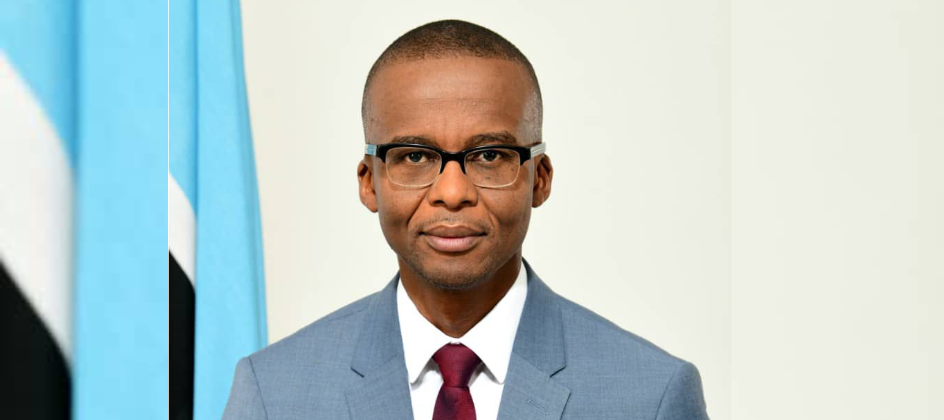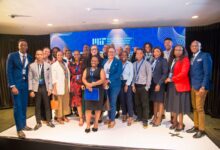
Botswana has taken a bold step toward redefining its economic future through a groundbreaking partnership with the Massachusetts Institute of Technology (MIT), aimed at accelerating its transition from a mineral-based economy to one driven by knowledge, innovation, and entrepreneurship.
Announced by Vice President and Minister for Finance Ndaba Gaolathe, the collaboration with MIT’s Kuo Sharper Center is part of a broader national vision to unlock inclusive growth, empower local innovators, and position Botswana as a regional hub for cutting-edge solutions.
With this initiative, Botswana is not only investing in ideas over extraction, but also sending a strong message to the global innovation community: the future is being built in Africa, and Botswana intends to lead.
The Vice President talks about this partnership in this interview:
Mr. Vice President, what motivated Botswana to pursue this bold partnership with the MIT Kuo Sharper Center, and how does it align with your broader national development strategy?
A: The MIT partnership is not just a collaboration, it is a signal of intent. We are deliberate about positioning Botswana as a country that drives solutions, not just consumes them. Our national development strategy demands that we transition from a mineral-exporting economy to one powered by ideas, systems, and human capital. The partnership aligns with our five-part national vision, which entails reinstating fiscal discipline, building strategic infrastructure, strengthening public institutions, repositioning state-owned enterprises, and overhauling our education system to prioritize science, innovation, and entrepreneurship. MIT brings tested approaches to support this ambition. This is how we ensure that our development journey is led by knowledge, innovation, and purposeful investment.
Botswana has often been cited as a model for stability and governance. How do you envision innovation-driven entrepreneurship adding a new dimension to Botswana’s legacy on the continent?
A: Botswana’s legacy of stability is founded on respect for the rule of law and an unshakable belief in democracy. The peaceful transition of power following our most recent general elections reaffirmed our commitment to constitutionalism and principled leadership. The task now is to leverage that stable foundation to foster widespread economic opportunity. Innovation-driven entrepreneurship allows us to extend our governance story into one of economic creativity. It empowers people to shift from being dependent on jobs to becoming creators of jobs and solutions. That is how we advance our legacy, by maintaining peace, and beyond that, delivering inclusive prosperity.
Collaboration & Commitment
This collaboration spans five years. What key milestones are you hoping to achieve by the end of this period?
A: Our focus is on creating a strong innovation ecosystem. Within five years, we expect to see functioning REAP and Sandbox programs at local institutions, startups scaling into regional markets, students solving real problems, and research moving into implementation. We will also embed a new delivery culture across institutions, focused on performance, not paperwork.
During the Foundry Fellowship reunion, you extended a heartfelt “Welcome home” to Africa’s leading entrepreneurs. What message do you hope that gesture sends to the global innovation community?
A: That Botswana is a hub of possibility. Welcome Home is a mindset that captures the spirit of the Botswana we are building together. As Africa steps forward into a new era of innovation and opportunity, Botswana is positioning itself as a home for entrepreneurs, creators, and problem-solvers from across the continent and beyond. Welcome Home is our invitation to bring your ideas here, to test them, refine them, and build them into something transformative. Our ambition is to create a country where innovation is supported by systems that work, where government does not stand in the way but stands beside you. We believe in co-creation, where public institutions and private initiative come together to solve the pressing challenges of our time.
Why is this partnership important in moving Botswana from a mineral-based economy to a knowledge-based economy?
A: Because minerals have finite value, but ideas are limitless. A knowledge-based economy depends on institutions, skills, and mindsets that are dynamic and adaptive. The MIT collaboration gives us a practical framework to build those capabilities across our society. It supports a shift toward entrepreneurship, research application, and a redefined development model where growth is driven by how we think and solve.
How will this partnership directly support job creation and diversify Botswana’s economy beyond traditional sectors like mining and tourism?
A: This partnership is structured to make entrepreneurship a viable path to employment. It introduces tools that help people move from ideation to execution. Through REAP and Sandbox models, we’ll see growth in sectors like health tech, agribusiness, fintech, and renewable energy—each with the potential to create jobs and expand our export base.
What role do Botswana-based startups, especially those in agriculture, health, and climate resilience, play in shaping your economic vision?
A: They are critical to our transformation. These startups are closest to the challenges that matter, whether it’s climate-smart agriculture, accessible healthcare, or digital financial solutions. We see them as the frontline of innovation. The MIT model complements this by nurturing enterprise through mentorship, structured testing, and exposure to global networks. When our startups thrive, the entire economy learns how to grow faster and smarter.
The replication of MIT’s Student Fellowship and Sandbox programs at BIUST and the University of Botswana is groundbreaking. How do you see these programs transforming the mindset and skillsets of Botswana’s youth?
A: They are changing the culture of expectation. Young people are beginning to see themselves as architects of solutions. These programs teach more than technical skills—they instill ownership, creativity, and the confidence to act. We are building a generation that understands that their ideas can shape industries. This mindset shift is at the heart of our national agenda.
Are there plans to introduce innovation-focused curricula in other educational institutions across the country?
A: Yes. Education reform is one of the pillars of our transformation. We are already working on aligning curriculum with the skills of the future—AI, data science, sustainability, and enterprise development. This transformation will not be limited to our major universities. It must extend to vocational training centers, teacher colleges, and senior secondary schools. Innovation must be a national language.
Regional Leadership
Botswana is increasingly seen as a beacon for African innovation. What steps are being taken to foster regional collaboration with neighboring countries?
A: We do not see Botswana as landlocked; we see it as landlinked. Our geographic position places us at the heart of the region, connecting key economies in southern and central Africa. This presents us with a strategic advantage. We aim to become a logistics and transit hub that facilitates the movement of goods, services, and ideas across borders.
We are advancing investments in cross-border freight corridors, rail networks, and dry ports that can open up new trade routes and reduce the cost of doing business across the region. These are not speculative projects. They form the foundation of our ambition to become a gateway for regional commerce.
In this regard, Botswana views SACU as a platform with broader potential. It is not limited to customs cooperation, but extends to regional industrialization, innovation, and supply chain integration. We also see immense opportunity under the African Continental Free Trade Area (AfCFTA). With a unified continental market, Botswana can export services, technology, and high-value goods instead of relying primarily on raw materials.
We are strengthening partnerships with neighboring countries, research institutions, and regional private sector actors to build common platforms for logistics, innovation, and trade facilitation. For the innovation economy to grow, it requires scale, openness, and reliable systems. These are qualities that a connected and collaborative region can deliver.
Do you see this model being replicated across Africa, and what role can Botswana play in that movement?
A: Yes, this model can absolutely be replicated across Africa. Many of our challenges are shared—slow execution, limited coordination, and missed opportunities. What we are building in Botswana is a practical framework that focuses on delivery, partnership, and impact.
Our role is to lead by doing. We are open to sharing what works, learning from others, and supporting regional peers who want to adopt similar approaches. Whether through SACU, AfCFTA, or bilateral cooperation, we believe Africa moves forward when we scale proven solutions and grow together.
What can Botswana do to encourage other African governments to join forces with Botswana to turn this into an Africa-wide initiative?
A: Botswana can lead by building trust, sharing evidence, and creating platforms for collaboration. We intend to document our progress transparently and make our tools, lessons, and delivery frameworks accessible to others. More importantly, we will continue engaging regional and continental institutions to co-create solutions that reflect African realities.
Our focus is not on prescribing, but on partnering—inviting others to shape a shared agenda that delivers tangible results for our people. If we can show that disciplined delivery works, others will see the value in aligning efforts. That is how we turn momentum into a continental movement.
Long-Term Legacy
Years from now, when historians look back at this partnership, what would you want them to say about Botswana’s leadership in this pivotal moment?
A: Let me close with what may well become one of the defining levers of our generation’s economic reform effort: The Botswana Economic Transformation Programme, or BETP. Launched only recently, this programme is our serious, time-bound commitment to dismantle the chronic barriers that have slowed our progress for too long. We are talking about bureaucracy, indecision, and poor coordination. BETP gives us the tools and the discipline to execute. It is about action, not theory.
We are bringing together ministries, regulators, financiers, and the private sector into the same room to co-develop high-impact, investment-ready projects. These include projects in infrastructure, agriculture, logistics, energy, and health—sectors that can absorb thousands of jobs and build resilience. We are doing this in just 12 weeks. We are applying rigorous analysis, clear accountability, and performance dashboards to ensure that delivery happens.
Through our Call for Ideas, we are inviting every entrepreneur, business, community leader, development partner, and public servant to to bring forward their ideas through the portal at www.cfi.gov.bw. Whether the idea is bold, complex, or simple, our Labs will co-evaluate, refine, and prioritise the best ones for execution. If it creates jobs, attracts investment, or solves a real challenge, we will act on it.
This is how we pivot from a mineral-based economy to one that is powered by knowledge. It is how we move from central planning to co-creation with our people. BETP is our tool for forcing reform through action. It is how we rebuild trust in government, create opportunity at scale, and plant the seeds of long-term shared prosperity.
My hope is that when the world looks back at this chapter, they will say: Botswana had the courage to turn its moment into a movement. That we chose delivery over delay. And that we rose together.
Follow us on WhatsApp, Telegram, Twitter, and Facebook, or subscribe to our weekly newsletter to ensure you don’t miss out on any future updates. Send tips to editorial@techtrendsmedia.co.ke



